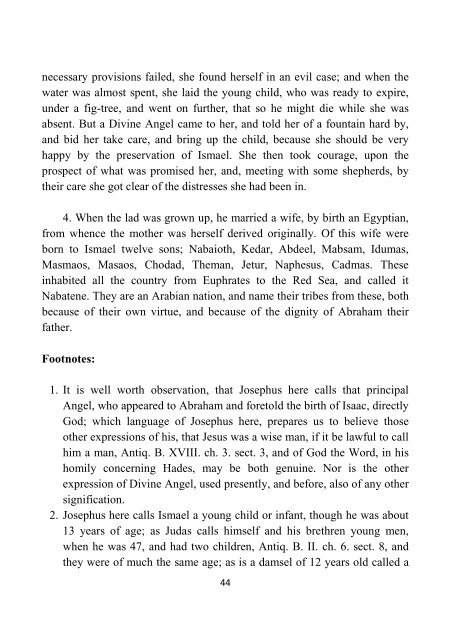From the Creation to the Death of Isaac - Flavius Josephus
- No tags were found...
You also want an ePaper? Increase the reach of your titles
YUMPU automatically turns print PDFs into web optimized ePapers that Google loves.
necessary provisions failed, she found herself in an evil case; and when <strong>the</strong><br />
water was almost spent, she laid <strong>the</strong> young child, who was ready <strong>to</strong> expire,<br />
under a fig-tree, and went on fur<strong>the</strong>r, that so he might die while she was<br />
absent. But a Divine Angel came <strong>to</strong> her, and <strong>to</strong>ld her <strong>of</strong> a fountain hard by,<br />
and bid her take care, and bring up <strong>the</strong> child, because she should be very<br />
happy by <strong>the</strong> preservation <strong>of</strong> Ismael. She <strong>the</strong>n <strong>to</strong>ok courage, upon <strong>the</strong><br />
prospect <strong>of</strong> what was promised her, and, meeting with some shepherds, by<br />
<strong>the</strong>ir care she got clear <strong>of</strong> <strong>the</strong> distresses she had been in.<br />
4. When <strong>the</strong> lad was grown up, he married a wife, by birth an Egyptian,<br />
from whence <strong>the</strong> mo<strong>the</strong>r was herself derived originally. Of this wife were<br />
born <strong>to</strong> Ismael twelve sons; Nabaioth, Kedar, Abdeel, Mabsam, Idumas,<br />
Masmaos, Masaos, Chodad, Theman, Jetur, Naphesus, Cadmas. These<br />
inhabited all <strong>the</strong> country from Euphrates <strong>to</strong> <strong>the</strong> Red Sea, and called it<br />
Nabatene. They are an Arabian nation, and name <strong>the</strong>ir tribes from <strong>the</strong>se, both<br />
because <strong>of</strong> <strong>the</strong>ir own virtue, and because <strong>of</strong> <strong>the</strong> dignity <strong>of</strong> Abraham <strong>the</strong>ir<br />
fa<strong>the</strong>r.<br />
Footnotes:<br />
1. It is well worth observation, that <strong>Josephus</strong> here calls that principal<br />
Angel, who appeared <strong>to</strong> Abraham and fore<strong>to</strong>ld <strong>the</strong> birth <strong>of</strong> <strong>Isaac</strong>, directly<br />
God; which language <strong>of</strong> <strong>Josephus</strong> here, prepares us <strong>to</strong> believe those<br />
o<strong>the</strong>r expressions <strong>of</strong> his, that Jesus was a wise man, if it be lawful <strong>to</strong> call<br />
him a man, Antiq. B. XVIII. ch. 3. sect. 3, and <strong>of</strong> God <strong>the</strong> Word, in his<br />
homily concerning Hades, may be both genuine. Nor is <strong>the</strong> o<strong>the</strong>r<br />
expression <strong>of</strong> Divine Angel, used presently, and before, also <strong>of</strong> any o<strong>the</strong>r<br />
signification.<br />
2. <strong>Josephus</strong> here calls Ismael a young child or infant, though he was about<br />
13 years <strong>of</strong> age; as Judas calls himself and his brethren young men,<br />
when he was 47, and had two children, Antiq. B. II. ch. 6. sect. 8, and<br />
<strong>the</strong>y were <strong>of</strong> much <strong>the</strong> same age; as is a damsel <strong>of</strong> 12 years old called a<br />
44

















